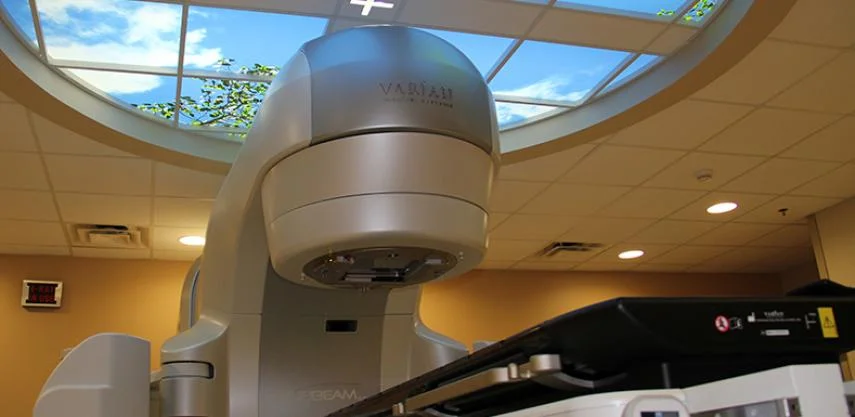About the MCSO Radiation Oncology Center
Opened in 2012, the MCSO Radiation Oncology Center provides patients access to innovative radiotherapy treatments consistent with larger medical and academic institutions, but with more one-on-one, personalized care within a non-hospital setting.
We treat our patients as if they were family and ensure the compassionate care they receive throughout their treatment and beyond is exemplary. We ensure that our entire team, all experts in their respective fields, are empathetic to the needs of our patients and make the well-being of each patient a priority.
Our board-certified oncologist, Dr. Timothy Hollister, and our compassionate care team offers patients an environment of wellness and support. We provide education to our patients about all the options that are available to them ensuring their understanding of how our state of the art facilities and technologies will help them achieve their best possible outcome.
We believe that a successful approach to treating cancer requires all medical disciplines working together, proactively sharing information. We challenge ourselves to achieve more each day, and with access to our highly trained specialists, and within a comfortable treatment environment, we believe we are making a difference in our community.
Treating Cancer with Radiation
Radiation Oncology involves the use of radiation to treat many forms of cancer. It can be delivered both internally and externally. The goal of all radiation therapy is to give the tumor a lethal dose of radiation while limiting the exposure to the surrounding healthy tissue. When treating with radiation, sophisticated dose calculations are made in order to contour the shape and intensity of the beam precisely to the targeted area.
There are many forms of radiation delivery systems. Traditional equipment delivers 3D conformal and Intensity Modulated Radiation Therapy (IMRT), which can create high dose volumes that are concave in shape and spare normal tissues that are close to and surrounded by the tumor.
During each field of treatment, the dose delivered is contoured by the multi-leaf collimator (a device that consists of a number of moving “fingers” or “leaves”), that position themselves dynamically in order to block portions of the primary beam and create a desired shape.
Other systems that support IMRT include Image Guided Radiotherapy (IGRT), which involves mapping the internal organs, treatment area and nearby structures using 2 and 3-D imagery so that the clinician can make adjustments for more accurate targeting.
Initial Consolation
During your initial consultation, we will obtain a medical history and you will be examined by a Radiation Oncologist. To help us understand your medical status, we will need to obtain copies of your medical records, health history, prescribed medications, and recent medical visits with other specialists, and if applicable, your biopsy reports. We will review your information with you and answer any questions you may have. You will also be asked to provide a list of medications that you are currently taking. You may continue your routine prescription medications unless advised otherwise by your physician.
Developing a Treatment Plan
Once it is determined that radiation therapy is the best way to treat your cancer, treatment planning begins. A treatment plan, which is a collection of measurements, imagery and dosing calculations, will be developed specifically for you so that the post treatment results are the best that they can be. Your custom-made plan is influenced by your overall health, type and stage of cancer. It also takes into consideration information from other specialists. You will undergo a special CT or PET scan called a "simulation". The imagery acquired during the simulation will allow your physician to target the tumor and avoid the other organs nearby. Your treatment will take place daily over several weeks or more. In order to ensure that you'll be in the exact same position for each of your radiation treatments, we may use specialized equipment to help hold you in place. Small temporary ink marks may be drawn on the skin to assist the therapists with body alignment.
Starting Daily Treatments
When the planning is complete, you will be treated with a linear accelerator that will deliver the radiation to your prescribed location. These technologies generate high energy x-rays or electrons that destroy tumor cells while minimizing the exposure to the healthy surrounding tissue. Radiation therapists, who are certified by the American Registry of Radiologic Technologists (ARRT), administer the daily treatment under the supervision of the Radiation Oncologist. They record and document treatment progress and run tests on the treatment machines daily to ensure that they are working properly. Most radiation treatments are given five times a week, Monday through Friday.
Post Treatment Care and Ongoing Support
Most people undergoing radiation treatment are able to continue with their normal activities. You may need to adjust your level of activity temporarily during treatment if you feel it is necessary. Always check with your doctor before starting any exercise program during this time. Good nutrition during therapy is essential to promote good healing and recovery and our team can help you determine the best approach. You will be weighed regularly during radiation therapy to monitor your health and any weight loss. Do your best to eat a normal well balanced diet with three regular meals; or, if you are unable to tolerate large portions, eat small frequent meals and snacks. Check with your doctor about the use of multivitamins and other dietary supplements. Nutrition information is also available through your radiation therapist.
In addition to the care and information that you will receive, we will provide information for local support groups in the community. Many cancer support groups and national organizations cater to all cancer types such as the American Cancer Society or more specifically Susan G. Komen, which provides support and donations for research and treatment for those diagnosed with breast cancer.



